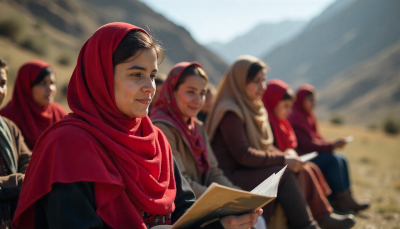Empowering Young Women in the Hunza

Empowering Young Women in the Hunza
Nestled in the breathtaking valleys of northern Pakistan, Hunza is home to vibrant communities with rich traditions and cultural heritage. Yet, like many rural areas, young women here often face social, educational, and economic barriers that limit their opportunities. Empowering young women in Hunza means providing access to quality education, skill development, and platforms for leadership—enabling them to contribute meaningfully to their communities and shape their own futures. By supporting initiatives that uplift and inspire, we can help these young women break barriers, embrace their potential, and lead positive change in Hunza and beyond.
Table Of Content
- 1. Introduction: Empowering Young Women in the Hunza
- 2. Access to Quality Education
- 3. Skill Development and Training
- 4. Leadership Opportunities
- 5. Encouraging Entrepreneurship
- 6. Community Support and Mentorship
- 7. Overcoming Social and Cultural Barriers
- 8. Impact Stories from Hunza
- 9. FAQs: Empowering Young Women in the Hunza
1.Introduction: Empowering Young Women in the Hunza
Hunza, a picturesque valley in northern Pakistan, is known for its rich culture and strong community values. Yet, young women in the region often face barriers to education, employment, and personal growth due to social and economic challenges. Empowering these women means providing them with opportunities to learn, lead, and innovate—helping them build confidence, acquire skills, and contribute meaningfully to their communities. By fostering education, mentorship, and leadership programs, we can unlock the potential of Hunza’s young women and inspire a generation of changemakers.
- Hunza is a culturally rich valley in northern Pakistan.
- Young women face social, educational, and economic barriers.
- Empowerment focuses on education, skills, and leadership opportunities.
- Mentorship and community support help build confidence and independence.
- Empowered women contribute meaningfully to their communities and inspire change.
Tip
Encourage young women in Hunza to pursue both traditional and modern skills—like local crafts, digital literacy, and leadership training—as this combination strengthens their independence and expands opportunities for education, employment, and entrepreneurship.
2.Access to Quality Education
Education is the cornerstone of empowerment. For young women in Hunza, access to quality education opens doors to knowledge, critical thinking, and future opportunities. Schools and community programs that provide a safe, supportive, and inclusive environment encourage girls to stay in school, excel academically, and dream bigger. Initiatives like scholarships, mentorship programs, and vocational training can further help bridge gaps and ensure that every young woman has the chance to learn, grow, and contribute meaningfully to her community.
-
Education is the foundation:
Education equips young women with essential knowledge, critical thinking skills, and problem-solving abilities. It broadens their horizons, builds confidence, and lays the groundwork for pursuing higher studies or professional careers, enabling them to make informed decisions about their lives. -
Safe and inclusive environment:
A secure, supportive, and inclusive learning environment encourages girls to attend school regularly and actively participate in class. Schools that promote gender equality, provide safe facilities, and address social barriers help students feel valued, respected, and motivated to succeed academically. -
Scholarships and mentorship:
Financial support through scholarships allows young women from underprivileged backgrounds to continue their education without economic stress. Mentorship programs connect students with role models who guide, inspire, and provide advice, boosting their confidence and helping them navigate educational challenges. -
Vocational and skill training:
Beyond traditional academics, vocational courses and skill-building programs empower girls with practical knowledge such as computer literacy, entrepreneurship, and technical skills. This equips them for diverse career paths, self-employment, and active participation in the workforce. -
Community support:
Encouraging community involvement—through awareness campaigns, parental engagement, and local organizations—ensures that girls receive encouragement and resources to pursue education. A strong support system helps break cultural and social barriers, allowing young women to thrive personally and academically.
3. Skill Development and Training
Skill development is a crucial step in empowering young women, as it equips them with practical abilities that complement formal education. In Hunza, training programs—ranging from vocational skills like handicrafts, digital literacy, and hospitality to leadership and communication workshops—help girls gain confidence and independence. These programs not only improve employability but also encourage entrepreneurship, enabling young women to create sustainable livelihoods and contribute meaningfully to their families and communities. By investing in skill development, we can ensure that Hunza’s young women are prepared to seize opportunities and overcome social and economic barriers.
-
Practical vocational skills:
Training in areas like handicrafts, sewing, weaving, and other traditional arts allows young women to preserve cultural heritage while gaining marketable skills for income generation. -
Digital literacy:
Learning computer skills, internet use, and basic coding equips girls to access online education, remote work opportunities, and digital marketplaces, expanding their career horizons. -
Entrepreneurship training:
Programs that teach business planning, financial management, and marketing empower young women to start their own ventures, become financially independent, and contribute to the local economy. -
Communication and leadership workshops:
Developing skills like public speaking, teamwork, and decision-making builds confidence and prepares girls to take on leadership roles within their communities. -
Continuous mentorship:
Guidance from experienced mentors helps young women apply their skills effectively, overcome challenges, and stay motivated to pursue personal and professional growth.
4. Leadership Opportunities
Leadership development is vital for empowering young women, enabling them to take initiative, make decisions, and influence positive change in their communities. In Hunza, providing platforms such as youth councils, community projects, and school leadership programs allows girls to practice responsibility, teamwork, and problem-solving. Encouraging young women to step into leadership roles not only builds their confidence but also challenges societal norms, creating role models for future generations. By fostering leadership skills, we ensure that these women can advocate for themselves and contribute meaningfully to the social and economic growth of their communities.
-
Encouraging participation:
Providing platforms for young women to engage in school councils, community projects, and local initiatives helps them gain experience in decision-making and teamwork. -
Leadership training programs:
Workshops focused on problem-solving, public speaking, and project management equip girls with the confidence and skills needed to lead effectively in various settings. -
Role models and mentors:
Connecting young women with female leaders and mentors inspires them to pursue leadership roles and demonstrates what is possible through guidance and support. -
Community involvement:
Encouraging girls to participate in social initiatives, volunteer programs, and local decision-making processes fosters responsibility and a sense of ownership in their communities. -
Building self-confidence:
Leadership opportunities help young women develop assertiveness, resilience, and problem-solving skills, enabling them to navigate challenges and advocate for themselves and others.
5. Encouraging Entrepreneurship
Encouraging entrepreneurship equips young women with the skills, confidence, and resources to create their own opportunities and achieve financial independence. In Hunza, fostering an entrepreneurial mindset helps girls turn their talents—whether in crafts, digital skills, or local services—into sustainable businesses. By providing training, mentorship, and access to funding, young women can overcome economic and social barriers, build self-reliance, and contribute meaningfully to their communities. Supporting entrepreneurship not only empowers individuals but also drives positive social and economic change in the region.
-
Business skills training:
Providing workshops on business planning, marketing, financial management, and customer relations equips young women to successfully start and run their own ventures. -
Access to funding:
Microloans, grants, and community resources enable aspiring entrepreneurs to invest in their businesses, purchase materials, and scale their operations. -
Mentorship and guidance:
Connecting young women with experienced entrepreneurs and local business leaders offers guidance, inspiration, and practical advice for overcoming challenges. -
Networking opportunities:
Participation in local events, trade fairs, and online communities helps young women build valuable connections, collaborate with peers, and promote their products or services. -
Encouraging creativity and innovation:
Supporting young women to explore new ideas, experiment with products or services, and adopt innovative solutions fosters self-confidence and sustainable business growth.
6.Community Support and Mentorship
Community support and mentorship play a vital role in empowering young women in Hunza. A strong network of guidance—from family, local leaders, teachers, and mentors—helps girls navigate educational, social, and professional challenges. Mentorship programs provide role models, practical advice, and encouragement, while community initiatives foster an environment where young women feel valued and supported. By combining guidance with active community engagement, these efforts help young women build confidence, pursue opportunities, and become positive agents of change in their society.
-
Mentorship programs:
Connect young women with experienced role models who provide guidance, advice, and encouragement. Mentors help girls navigate educational and career challenges, boosting their confidence and inspiring them to achieve their goals. -
Family and community encouragement:
Support from parents, siblings, and local leaders motivates girls to pursue education and personal growth. A nurturing environment reinforces their self-esteem and helps break cultural or societal barriers. -
Networking opportunities:
Community events, workshops, and local organizations allow young women to build connections, share experiences, and collaborate on projects, fostering leadership and teamwork skills. -
Awareness campaigns:
Initiatives that educate communities about the importance of women’s empowerment encourage inclusive participation and help challenge traditional norms that limit girls’ opportunities. -
Long-term support:
Continuous guidance, feedback, and encouragement ensure that young women remain motivated, resilient, and capable of overcoming obstacles throughout their educational and professional journeys.
7.Overcoming Social and Cultural Barriers
Young women in Hunza often face social and cultural norms that limit their access to education, career opportunities, and personal growth. Overcoming these barriers is essential to empower them to reach their full potential. By raising awareness, promoting gender equality, and engaging families and communities in supportive initiatives, young women can challenge traditional limitations. Programs that encourage open dialogue, mentorship, and inclusive participation help girls navigate societal expectations while building confidence, resilience, and independence. Addressing these barriers ensures that every young woman in Hunza has the opportunity to thrive and contribute meaningfully to her community.
-
Raising awareness:
Educating families and communities about the importance of gender equality and women’s empowerment helps challenge traditional norms and encourages support for girls’ education and personal growth. -
Community engagement:
Involving local leaders, schools, and organizations in advocacy programs creates a supportive environment where young women feel valued and encouraged to pursue their goals. -
Mentorship programs:
Connecting girls with mentors and role models who have successfully navigated social barriers provides guidance, motivation, and practical strategies for overcoming challenges. -
Encouraging open dialogue:
Promoting discussions on gender roles, cultural expectations, and women’s rights within families and communities fosters understanding and gradual social change. -
Empowering through education and skills:
Providing access to education, vocational training, and leadership opportunities equips young women with the knowledge and confidence needed to challenge societal limitations.
| Name | Age | Achievement | Impact |
|---|---|---|---|
| Ayesha Ali | 22 | Started a handmade crafts business | Provides employment to local women and promotes Hunza culture |
| Fatima Karim | 20 | Founded a digital literacy program for girls | Empowered over 100 girls with computer and online skills |
| Hina Gul | 24 | Leads a community mentorship initiative | Supports young women in education, career, and leadership development |
| Samina Hunza | 23 | Developed eco-friendly textile products | Promotes sustainable entrepreneurship and environmental awareness |
8. Impact Stories from Hunza
The inspiring journeys of young women in Hunza highlight the power of education, mentorship, and community support in transforming lives. These impact stories showcase how access to skills, leadership opportunities, and entrepreneurial guidance enables girls to overcome social and cultural barriers. By pursuing their passions, starting businesses, leading community initiatives, and advocating for change, these young women serve as role models for others, demonstrating that empowerment creates lasting positive effects for individuals and their communities.
FAQs
1. Why is empowering young women in Hunza important?
Empowering young women ensures they have access to education, skills, leadership opportunities, and entrepreneurship, enabling them to contribute meaningfully to their communities and achieve independence.
2. What are the main barriers young women face in Hunza?
Social and cultural norms, limited access to education, economic challenges, and lack of mentorship are common barriers that prevent young women from reaching their full potential.
3. How does education empower young women?
Education provides knowledge, critical thinking, and opportunities for personal growth, enabling girls to pursue careers, leadership roles, and entrepreneurship confidently.
4. What role does skill development play?
Skill development equips young women with practical abilities like digital literacy, vocational skills, and business knowledge, helping them gain confidence and financial independence.
5. How can mentorship help young women?
Mentorship connects girls with experienced role models who provide guidance, motivation, and practical advice, helping them navigate challenges and build leadership skills.
6. Why are leadership opportunities important?
Leadership opportunities allow young women to develop decision-making, communication, and problem-solving skills, preparing them to lead initiatives and contribute positively to their communities.
7. How does entrepreneurship empower young women?
Entrepreneurship fosters financial independence, confidence, and innovation, enabling girls to turn their skills and ideas into sustainable businesses.
8. How can young women overcome social and cultural barriers?
Through awareness, community support, mentorship, education, and skill development, girls can challenge traditional norms and pursue their goals confidently.
9. How does community support make a difference?
Community programs, family encouragement, and local initiatives provide safe, inclusive spaces, resources, and networking opportunities that empower young women to thrive.
10. Can empowered young women inspire others?
Yes. Their achievements in education, leadership, and entrepreneurship serve as role models, demonstrating that empowerment can create lasting positive change in their communities.










